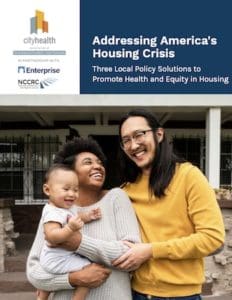2.0 Policy Package
The quality, safety, affordability, stability, and even the location of one’s home have profound health implications. Poor health outcomes are associated with housing costs, quality, stability, and neighborhood context — and are much more likely to affect people of color as well as low income and vulnerable populations.
- One in four renters, or 10.9 million people, spend more than 50% of their income on housing
- More than 500,000 people experience homelessness on any given night
- America has a shortage of nearly 7 million affordable homes — for every 100 families who need them most, only 37 affordable homes are available
Cities can lead in addressing America’s housing challenges by adopting local policy solutions that can increase affordable housing and improve health and racial equity. CityHealth’s new report, Addressing America’s Housing Crisis: Three Local Policy Solutions to Promote Health and Equity in Housing, explores three policies in its 2.0 package: Affordable Housing Trusts, Healthy Rental Housing, and Legal Support for Renters.
While many communities across the country have similar housing-related resource needs, each has unique population and market conditions. An Affordable Housing Trust is a flexible funding tool that allows local leaders and policymakers to meaningfully respond and support housing affordability and stability initiatives. These trust funds are uniquely designed so that dollars remain in the fund, even if they are not expended in a fiscal year, and are strictly dedicated to eligible housing-related activities.
Affordable Housing Trusts are a powerful tool that can help make communities more livable and accessible for residents of all incomes, especially those with the lowest incomes. According to the Affordable Housing Trust Fund Project, 122 cities have housing trust funds, generating revenues in excess of $1.2 billion in 2021.
The existing conditions of a home and how it is maintained for its lifetime has direct ties to household health. Inadequate or substandard housing conditions can lead to negative health impacts and exacerbate existing health conditions for an individual. Healthy Rental Housing policies (often referred to as proactive rental inspection policies) enact a systematic approach to identifying substandard conditions.
The objective of Healthy Rental Housing policies is to minimize the number of renters living in homes with unhealthy and unsafe living conditions that can lead to or exacerbate physical and mental health issues. These policies advance public health by preserving and creating safe, healthy living conditions for renters. When implemented effectively, Healthy Rental Housing policies ensure that existing healthy homes are well maintained and bring substandard rental homes up to livable standards.
As renters navigate the post-pandemic rental housing market, where housing affordability, accessibility, and quality are in decline, they face an increased risk not only of eviction but facing such an action unrepresented. Evictions are a source of homelessness and housing instability, affecting physical safety and health, decreasing healthcare access, and increasing poor health outcomes.
A Legal Support for Renters policy is an evidence-based, cost-effective approach to preventing more evictions and alleviating the attendant harms. A Legal Support for Renters policy aims to prevent or mitigate the harms of eviction by ensuring that all eligible tenants facing eviction have legal representation in these substantively and procedurally complex cases.
Join Us and Hear from Local Leaders
CityHealth will host two webinars to discuss the policies and share insights and best practices from city leaders and our partners. Learn how these evidence-based, cost-effective policy solutions can contribute to the health of city residents by increasing housing affordability and availability, safety, and stability — and can advance health and racial equity.
Affordable Housing Trusts & Healthy Rental Housing
CityHealth and Enterprise Community Partners held a webinar on Aug. 25 on Affordable Housing Trusts and Healthy Rental Housing.
Featuring:


Laura Brudzynski, Deputy Director of Operations at Denver’s Department of Housing Stability
Legal Support for Renters
CityHealth and the National Coalition for a Civil Right to Counsel (NCCRC) held a webinar on Sept. 8 @ 2:30pm ET on Legal Support for Renters.
Featuring:


Councilmember Helena N. Moreno of the City of New Orleans

